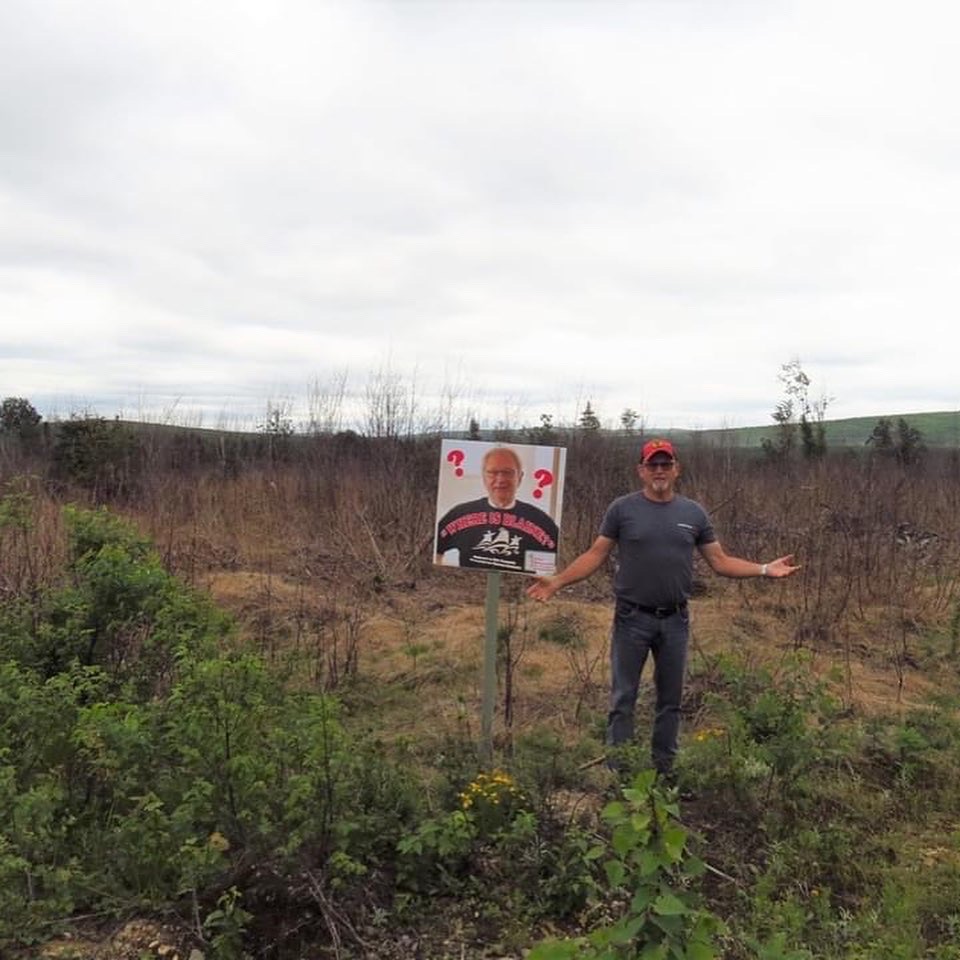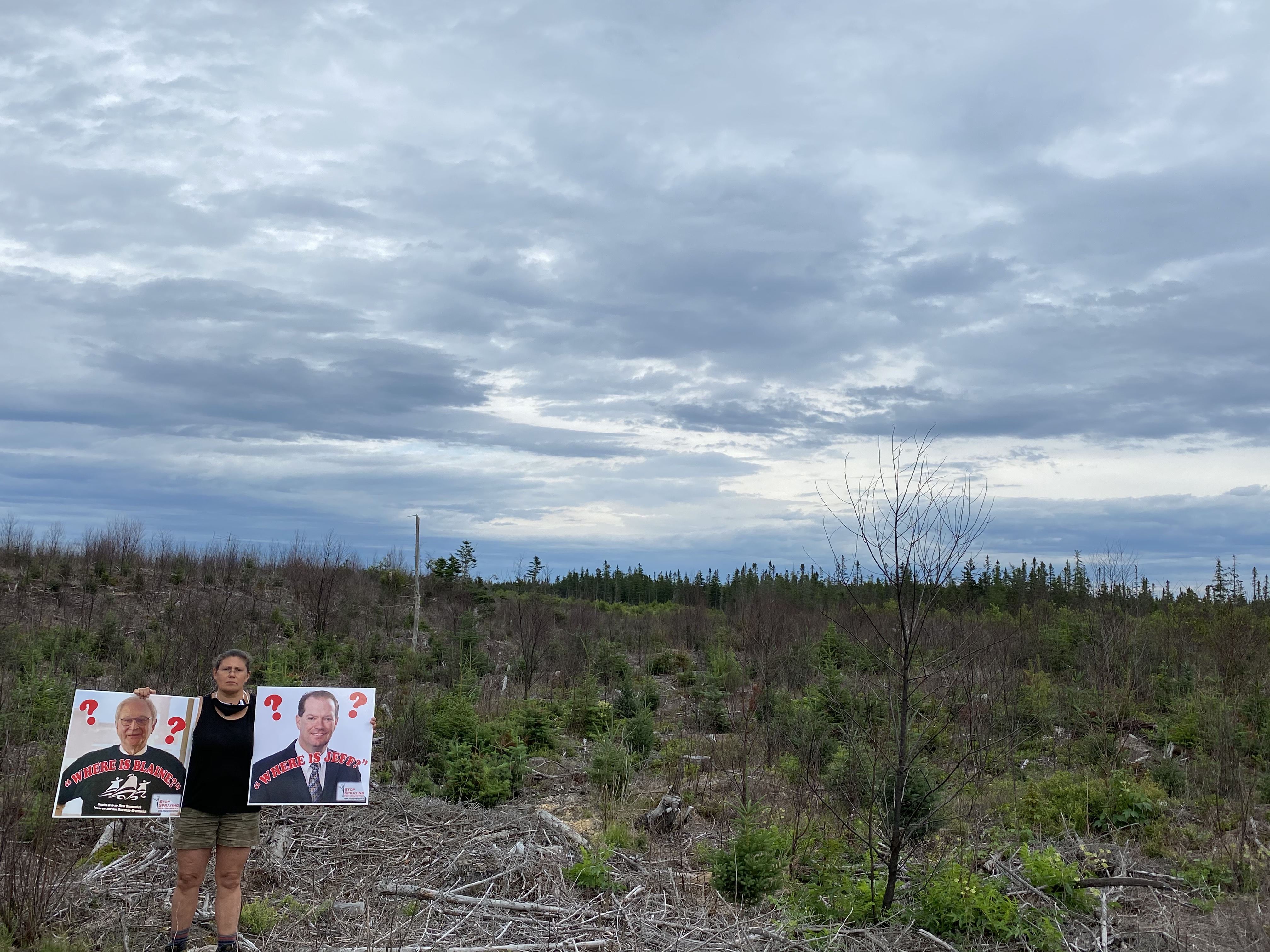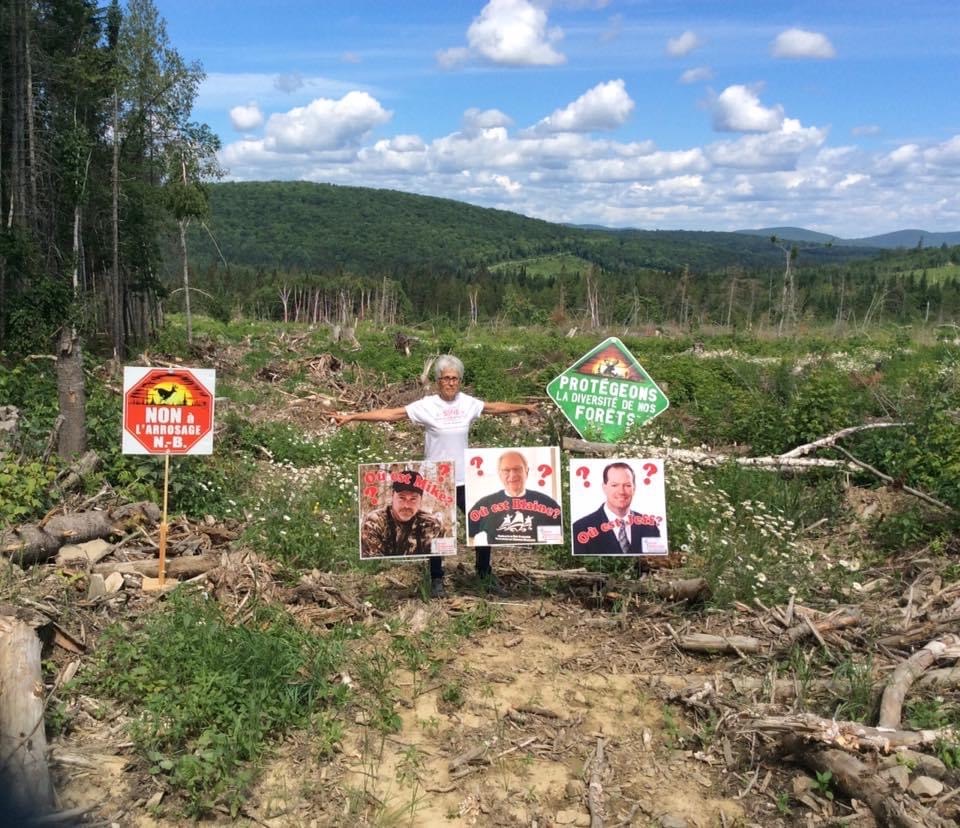Action Alerts
- Posted by Jim Emberger
- Hits: 3771
I want to urge all of you in groups to have your group sign on to this letter, requesting that the German government not guarantee a $4.5 billion loan to Pieridae Energy to build a liquid natural gas (LNG) export terminal in Goldboro, Nova Scotia.
This project has been progressing under the radar for some time now and is approaching a critical point. The scope of this project encompasses shale gas wells in Alberta, and potentially fracking in Quebec, New Brunswick and Nova Scotia, as well as new gas pipelines through Quebec to Maine, along with the main object - the LNG terminal in Goldboro.
These big LNG export projects are the last gasp of the fossil fuel industry, and if built, the new fossil fuel infrastructure will seriously slow down the necessary move to a clean energy economy to address climate change. It will put us back years. New Brunswick currently has no fracking, but ask yourself what Blaine Higgs or Kevin Vickers would do if told that a company with a huge loan from Germany wanted to restart the shale gas industry in NB? I think we all know the answer.
So we need to stop this before any money actually enters the picture! Pieridae currently has leases near Hillsborough and Memramcook, but remember that over 40% of the province was opened to fracking the last time around. We will all be affected.
So it is REALLY IMPORTANT that groups sign on to show Germany that opposition is broad and deep. We expect in the next few days to have signatures from several of Canada's well-know national environmental stewardship groups, but we also need to show that the grassroots groups - including local chapters - are united. To sign-on, just have a representative from your group go to:
https://docs.google.com/spreadsheets/d/1BIhbCqo6aYH3NcYxevscbacUmGGxpNIv8cZZ2kGCh18/edit#gid=0
and scroll down the list to the end, where you can enter your group's name, a contact person and email (or phone or address). That's it. As you scroll, you will see that support is coming from all the provinces involved plus our international allies in Germany and elsewhere around the world.
Our Germans allies are doing their part by demonstrating against the LNG terminals that will have to be built at their end - as noted yesterday in these tweets from Andy Gheorghiu, our colleague at Food and Water Watch - Europe
https://twitter.com/GheorghiuAndy/status/1302923156320063490?s=19
https://twitter.com/GheorghiuAndy/status/1302930718792843266?s=19
and this story (google translation of article by the German Press Agency)
Hanover - Five climate activists attached themselves to the building of the Lower Saxony State Chancellery in Hanover with superglue on Monday. According to the police, they were part of a group of 25 demonstrators who protested against imports of liquefied natural gas (LNG) from the United States. The police said they negotiated with the five people who were stuck so that they could free themselves with solvent. Various environmental groups had called for the action. They criticized the plans to build terminals for the import of LNG in Wilhelmshaven and Stade. In the USA and Canada, a lot of natural gas is currently extracted using the fracking method, which is considered to be particularly harmful to the environment. State Chancellery officials spoke to the demonstrators, a press spokeswoman said.
So it is real! If you need to read the letter again before signing, you can do so here:
https://drive.google.com/file/d/12UAYENzvBF-Nc4f5GcEUQb6xqDmmWyWx/view?usp=sharing
https://drive.google.com/file/d/1TCkFxbw6J_bukKsbkg5WkEyd5Q9CrMN2/view?usp=sharing (en francaise)
Many local groups faded into inactivity once we got a moratorium, but if there is even a shell of your group, please sign, because we know that we would once again have massive turnout if we had to mobilize. I personally think that this could be our largest threat since the moratorium if it gains any momentum. So please sign any group you can - it doesn't matter what kind of group it is - if they are concerned about climate change and/or opposed to shale gas in NB. And please pass along. Thanks. Jim
NBASGA in the News:
There is so much going on that I didn't send out these pieces, which appeared last week in the Brunswick News papers.
I had a Commentary in the daily Gleaner about the connections between climate change and the COVID pandemic, and how the parties needed to tell us how they will weave the two together in their COVID recovery plans. It briefly touches on SMNR's as well.
https://www.noshalegasnb.ca/leaders-must-say-how-theyll-combat-climate-change/
Sam Arnold, of the Sustainable Energy Group in Woodstock had a letter to the editor on SMNR's.
https://www.noshalegasnb.ca/small-nuclear-reactors-not-the-solution-to-the-climate-crisis/
SMNR's
As SMNR's have become an election issue, you may want to know more about them. Here is a link to a video of a presentation on the topic recently given in Saint John by Dr. Gordon Edwards, scientist, nuclear consultant and president of the Canadian Coalition for Nuclear Responsibility
https://nbmediacoop.org/2020/03/15/gordon-edwards-on-small-modular-nuclear-reactors-video/
-- Jim Emberger, Spokesperson New Brunswick Anti-Shale Gas Alliance
- Posted by Caroline Lubbe-D'Arcy
- Hits: 3740
SSNB has launched a new sign campaign to call out THREE NB politicians, who have to power to #StopSprayingNB, namely DNRE Minister Mike Holland, DOELG Minister Jeff Carr, and Premier Blaine Higgs.
Forestinf.ca has published the 2020 Forest Herbicide Spray Map,
MANY of our supportesr have picked up signs and have submitted photos on our public Facebook group.



- Posted by Sam McWilliams
- Hits: 3493


We are welcoming you to review our recommendations in the attached white paper, and your sign on as a supporter of any recommendation, a whole pillar, or the whole document. If you would like to lead any one area of these recommendations we are completely open to collaboration and to following your lead.
This advocacy campaign is lead by our new Foundation for Resilient Health, which is built on the strong foundation of the Canadian Network for Human Health and the Environment (a subsidiary of the New Brunswick Lung Association). The Foundation for resilient health expands on our work with health professionals, health and environment organizations, and on our expertise in environmental health. The Foundation for Resilient Health springboards from this history, trust, and evidence-based expertise, into the realm of promoting the key pillars of resilient health.
The four pillars for action laid out in our attached White Paper include:
- Our Natural Environment - protecting our natural support system
- Climate Change - recognizing the existential threat posed by climate change and taking immediate action
- Public Health and Wellness - shifting the health care focus to wellness and illness prevention
- Economy - improving financial equity in Canada
Our pillars and recommendations were developed following consultation with many key experts across Canada and are founded in scientific evidence. We have engaged the services of a national lobbyist to help us bring these issues to the attention of our Members of Parliament and we will work with our elected officials to achieve change in these areas. Some recommendations can be achieved in the short term; others will take perhaps years of engagement.
We invite you to read our White Paper that forms the backbone of our advocacy plan. We are inviting you to let us know if some or all of our recommendations resonate with the broader goals of your organization. If you would like to add the name of your organization as a supporter of any recommendation, a whole pillar, or the whole document, please let us know. If you would like to lead any one area of these recommendations we are completely open to collaboration and to following your lead.
If you respond by signing-on we will collaborate with you as our work progresses.
To sign-on or for more information email mlangille@resilient-health.ca
Click here to see the invitation to sign-on and for more information on the Foundation for Resilient Health.
- Posted by Sam McWilliams
- Hits: 3866
The New Brunswick Lung Association has lead a small committee* to review the New Brunswick Environmental Impact Assessment Regulation under the Clean Environment Act. We have identified the need for change, the benefits that could arise from stronger legislation, current weaknesses and areas where the Regulation is very out of date, and have made recommendations that will modernize the process.
We are now welcoming your review of our recommendations and your sign-on if you would like to support our campaign. Please see the attached full document here. The summary is below.
We have an excellent window of opportunity now for the Province of New Brunswick to modernize legislation that assesses and mitigates impacts from proposed industrial activities. During the Covid-19 Pandemic, New Brunswickers have become more aware of the importance of health protection and have been proud of the actions the multi-party government committee has taken. We want to see our government continue to be a national leader. Given that the New Brunswick Environmental Impact Assessment process is very out-of-date, now is an excellent time to develop new legislation that will be supported by New Brunswickers.
The current EIA process has inconsistencies that cause uncertainties and inefficiencies experienced by the proponent. These could discourage potential developers from choosing NB for their project. Developers need to be confident in a consistent and transparent assessment process.
The New Brunswick government has committed to responsible resource development and sound legislation is imperative to managing our natural resources on which all of us rely.
New Brunswick struggles with a declining economic situation. The cost of health care in the province is steadily increasing. Full cost-accounting of new enterprises is essential. Our government must take into account the health and social costs of new enterprises when going through the approval process for new initiatives. A strong modernized Impact Assessment Act can help to greatly reduce the negative health and social costs of new projects.
It is critically important that New Brunswick has a robust and modern Impact Assessment process especially as we grow forward into a new post-Covid world where New Brunswickers want to ensure that new developments will not compromise their health, their environment or the social fabric of their lives that make New Brunswick such a great place to live and raise a family. New Brunswickers now expect that their health will be protected, that Impact Assessments are undertaken with proactive consultation with First Nations and community stakeholders and that the process is transparent.
We can take action to join other Canadian leading jurisdictions that have modernized their Impact Assessment legislation to better protect the health of New Brunswickers and protect all aspects of our environment.
We are asking that the province create a new Impact Assessment Act that is modelled after updated Acts in the leading jurisdictions in Canada, notably the Federal Impact Assessment Act (2019) and the British Columbia Environmental Assessment Act (2018). Modern Impact Assessment processes include consideration of human health, community and social impacts and compounded impacts. Thus Impacts Assessment now go beyond environmental impacts, and responsibility will involve more than one government department. The new Impact Assessment legislation should therefore be a stand-alone Act.
Below are the recommendations developed by the Committee. The full Report provides the rationale and details.
- The NB Impact Assessment Act should be consistent with current and common IA methodology.
- The NB Impact Assessment Act requires a formal statement of guiding principles.
- The NB Impact Assessment Act needs to expand analysis of anticipated impacts.
- The NB Impact Assessment Act must include a stand-alone, transparent health impact assessment process that proactively engages stakeholders. The full cost of negative health and other social outcomes must be calculated and balanced with the financial benefits of the project.
- Schedule A needs to be either expanded or changed to show clear parameters without listing specific activities.
- The NB Impact Assessment Act needs more oversight and rigor for engagement with First Nations and the public (on reviews committees, through notification of standing lists of interested parties) and for any consultation.
- The NB Impact Assessment Act needs to more effectively and transparently incorporate scientific evidence into decision-making.
- Decision-making associated with The NB Impact Assessment Act needs to be transparent.
- Approved projects need regular standardized and publicly transparent monitoring, using best practices.
- Cases of non-compliance must be identified, made public and quickly remedied.
- A system to measure and report on the effectiveness of the The NB Impact Assessment Act needs to be developed and implemented.
- Regular reviews of the Act are needed.
*Committee Members:
- William Anderson, PhD.
- Chris Buse, PhD. University of British Columbia Postdoctoral Fellow and Affiliated Researcher with the Centre for Environmental Assessment Research
- Gordon Dalzell, Saint John Citizen’s Coalition for Clean Air
- Barbara MacKinnon, PhD. President and CEO New Brunswick Lung Association
Contact: barb.mackinnon@nb.lung.ca
- Posted by Raissa Marks
- Hits: 4702
Over this past year, who stands out in your mind?
We invite you to nominate a group or individual deserving of one of the NBEN awards which will be presented in style at Eco-Confluence 2019. Send an e-mail to nben@nben.ca describing your nominee’s work. Nominees must be members or associates of the NBEN , not including current Steering Committee members.
Nomination deadline is Friday, October 11, 2019.

